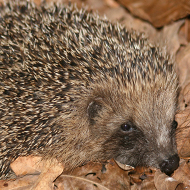'Lockdown bonfires' spark concern for hedgehogs

The BHPS is urging people not to build bonfires until the day they are due to be lit.
A leading hedgehog charity has urged people planning garden bonfires this Guy Fawkes season to take steps to protect hedgehogs and other wildlife.
The British Hedgehog Preservation Society (BHPS) fears that with many public firework displays cancelled, more people may have bonfires at home to celebrate the event instead.
Fay Vass, chief executive of the BHPS, said: “With people missing their annual trip to large events marking bonfire night, we fear they may decide to build a bonfire at home instead. Many small bonfires in back gardens, which are a stronghold for hedgehogs, is even more concerning than the usual huge fires held in the middle of a field.”
In a bid to protect hedgehogs and other garden critters, the BHPS is urging people not to build bonfires until the day they are due to be lit. It stresses that not only will this help to save wildlife, but it will also protect the bonfire from getting soaked by rain overnight.
The BHPS also asks that people check their bonfires before lighting, even if they have only been left unattended for a short time. Hedgehogs tend to hide in the centre and base of the bonfire, which people can check by gently lifting the section with a pole or broom - not a spade or a fork which can injure hedgehogs.
Fay added: “If a hedgehog is found, take as much of the nest as you can with it and place in a high-sided cardboard box with plenty of newspaper/old towelling. Ensure there are air holes in the lid and that the lid is secured firmly to the box, as hedgehogs are great climbers.
“Wear gardening gloves or use an old towel to handle them so as not to get human smells on them and to keep them calm as hedgehogs are easily stressed; it also protects your hands from their spikes! Put the box in a safe quiet place such as a shed or garage well away from the festivities and offer the hedgehog some meaty cat or dog food and water.”
She added: “In case you have missed anything light the fire from one side only. Once the embers are totally dampened down, release the hedgehog under a hedge, bush or behind a stack of logs near where it was found, with its original nesting materials.”



 The latest
The latest